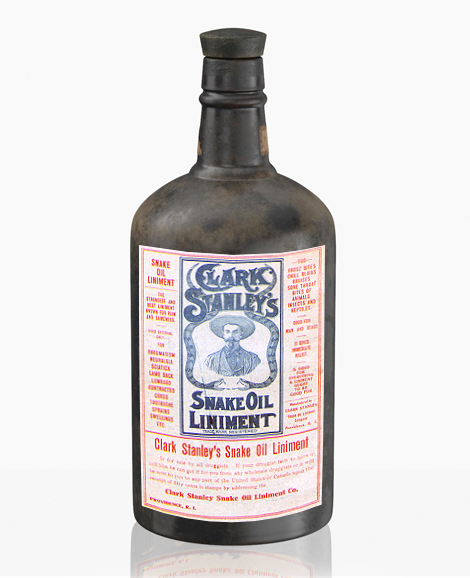 We
have all heard oversold marketing campaign slogans. Take the healthcare
industry for example. From the frontier miracle cure peddler who claimed his castor
oil and garlic elixirs could fix anything from arthritis to cancer, to hot yoga
aroma therapy that promises to sweat out all the toxins that plague us, there
have been all kinds of claims to sell us products that supposedly solve
anything that ails us. Of course outlandish marketing misrepresentations don’t
just stop at health related products. No, you can take your choice of products
and services across just about any industry and, very likely, you will find a
charlatan in the marketing mix. Of course, if you can back up your eccentric
marketing claims, are you really boasting? But if you can’t, do you have any
credibility?
We
have all heard oversold marketing campaign slogans. Take the healthcare
industry for example. From the frontier miracle cure peddler who claimed his castor
oil and garlic elixirs could fix anything from arthritis to cancer, to hot yoga
aroma therapy that promises to sweat out all the toxins that plague us, there
have been all kinds of claims to sell us products that supposedly solve
anything that ails us. Of course outlandish marketing misrepresentations don’t
just stop at health related products. No, you can take your choice of products
and services across just about any industry and, very likely, you will find a
charlatan in the marketing mix. Of course, if you can back up your eccentric
marketing claims, are you really boasting? But if you can’t, do you have any
credibility?
In
marketing, we like to use emphatic words to catch the attention of our
customers. Calling something the "best” or the "greatest”, the "fastest” or the
"highest” are ways we try to separate our brand from our competitors’ brands.
Think of the many times you have heard these words used in marketing:
- Best
prices
- Best
service
- Greatest
selection
- Greatest
value
- Fastest
delivery
- Fastest
connections
- Highest
quality
- Highest
customer satisfaction
The
problem with using these words to describe your brand is twofold: they are overused
and tend to miss the mark in catching the attention of the target market, and
they often cannot be truly qualified. How do you measure the best service from
one brand to the other? But the real problem is the claim is often unbelievable
to the consumer, so they can feel disconnected from a brand that is all talk
and no show. If you are trying to build brand loyalty amongst the people who
make up your customers, you will miss the mark if you are unbelievable in your
brand marketing claims. However, on the flip side, if you can find the one
thing that sets you apart from your competition and it can be backed up with
your products and services, you will have not only loyal customers, but you
will also gain people who will help you market your brand by spreading the word
about it.
How
do you do this? First, understand what you are selling. There are innovative
products that come along and change the way we live every so often. They are
revolutionary. But most of the time, products and services are slightly
different from the competition’s products and services. This leads me to the
second thing: understand what your customers want from you. Once you have
established this, next ask yourself: are we giving them what they really
want? If so, your marketing message should be fairly easy. But if you are
falling short, ask yourself what the competition is doing to solve this problem
that you are not. Likewise, turn the tables and ask what the competition is
doing that misses the mark with the customer. Make a distinction between the
two competing factions. Is the difference in what you offer the customer more
or less in line with what the customer really wants? If it is better than what
the competition offers, build your marketing message around this difference. If
not, it is time to make some changes and, after you do, to emphasize the
change. The "new” you is very marketable if it truly addresses a need of the
customer and does things better than your competition.
Here
is the bottom line: in marketing, you can make any claim that you want. If you
cannot back it up, it will eventually do you in. People are not stupid, at
least not forever. They will figure out if you are overselling them. If you do,
it will damage your brand and destroy customer loyalty. Build your marketing
campaigns around the best parts of your brand that you can back up. We live in
a "show me” rather than a "tell me” economy right now. If you can back up what
your marketing claims are saying, you will be successful in promoting your
brand. If not, your brand will be on the level of the snake oil peddler – all talk,
no show.